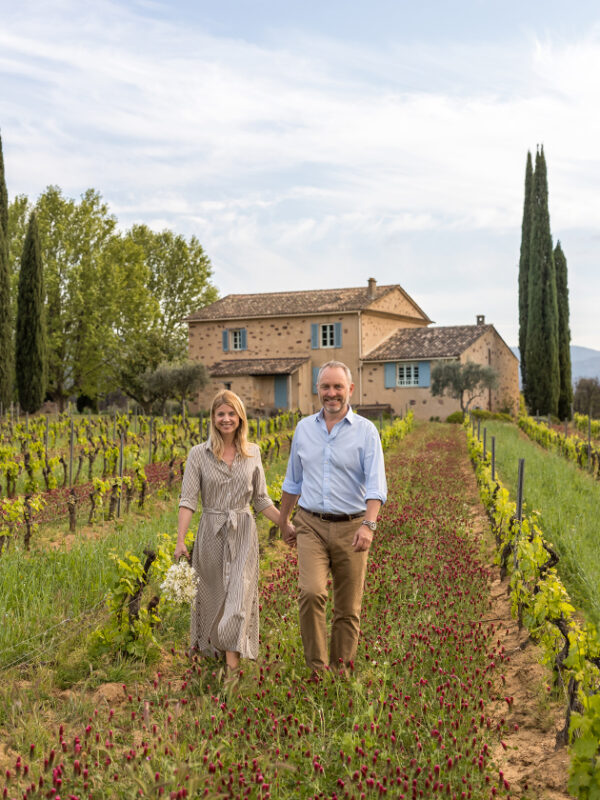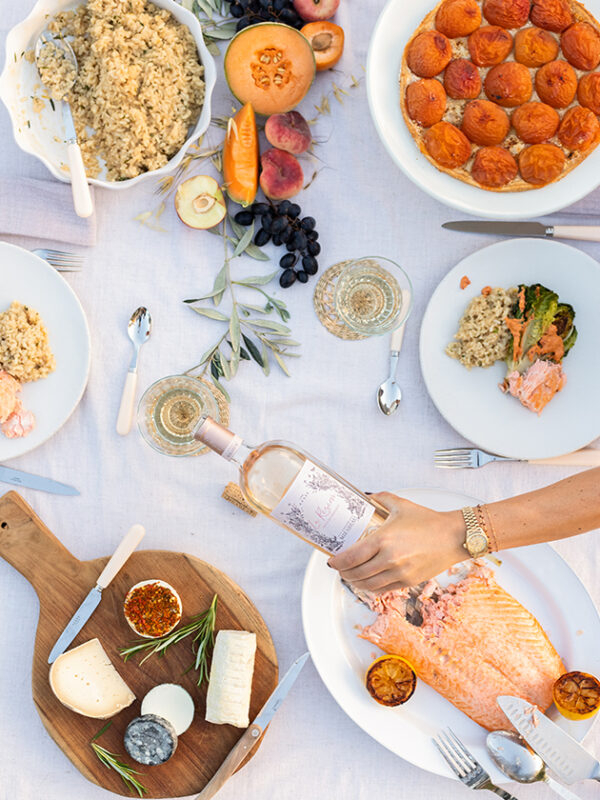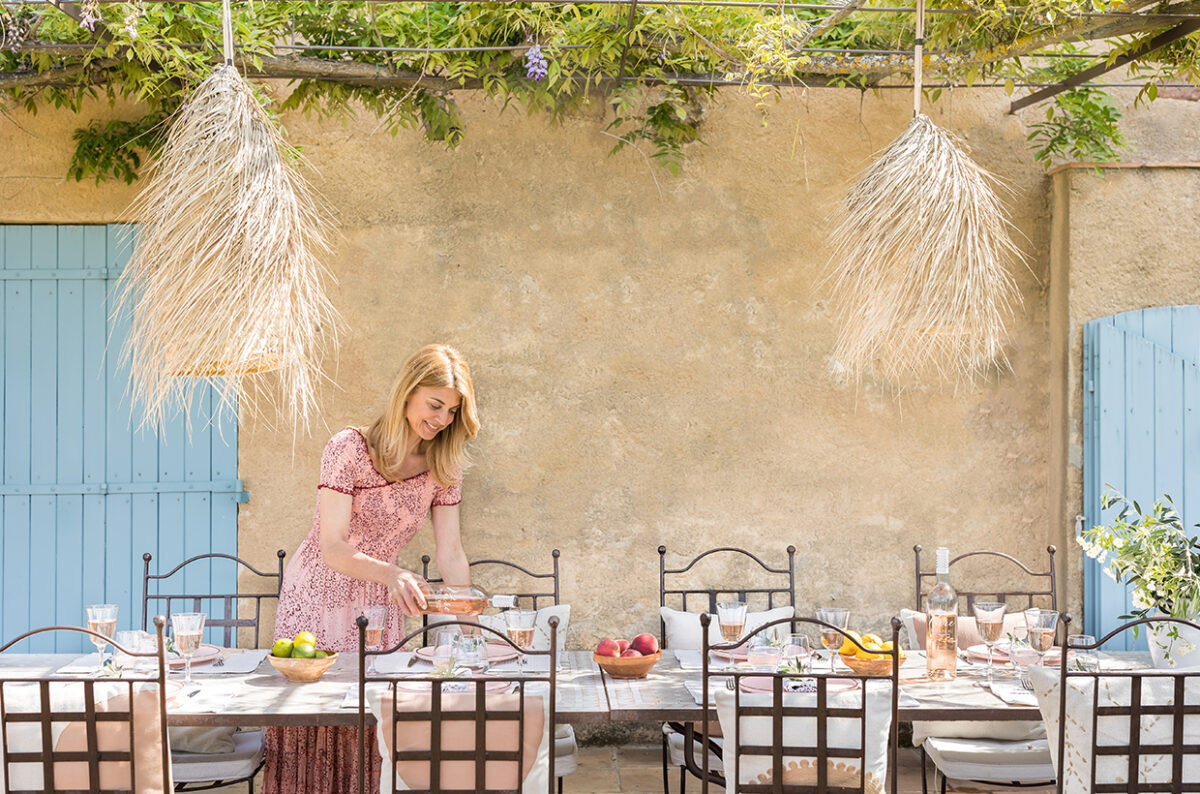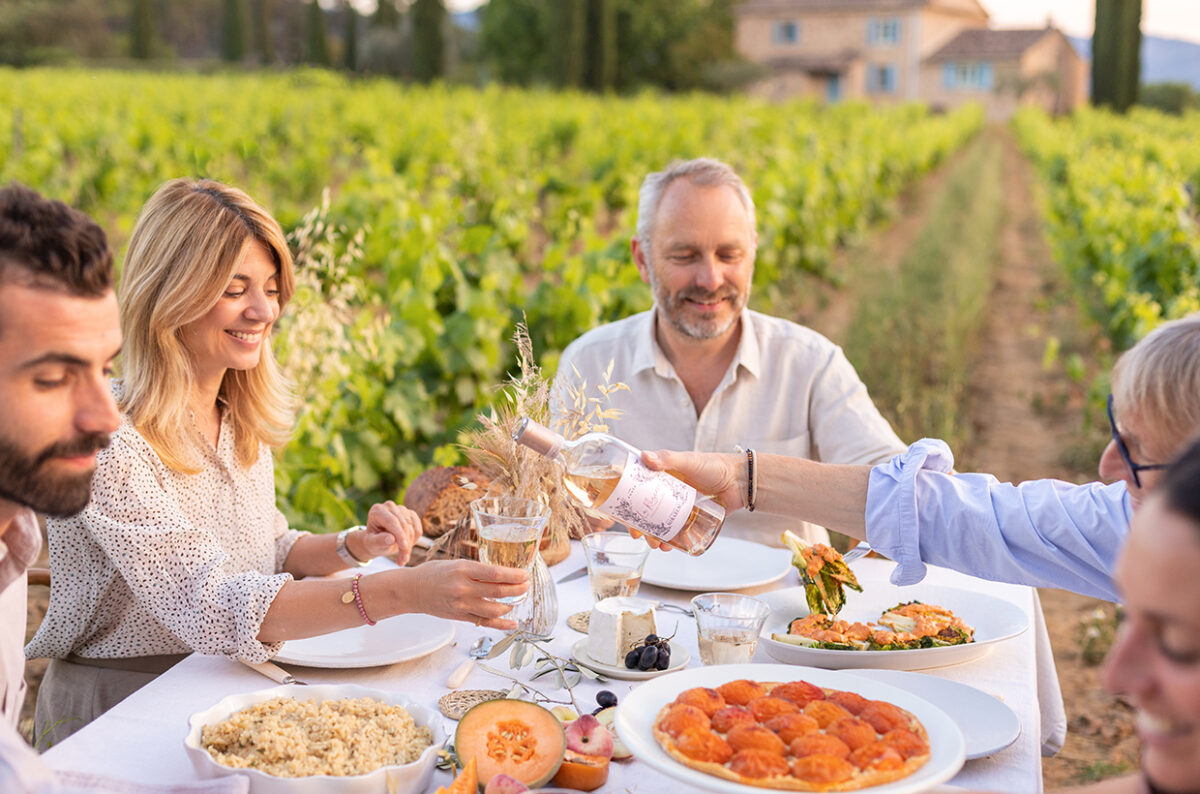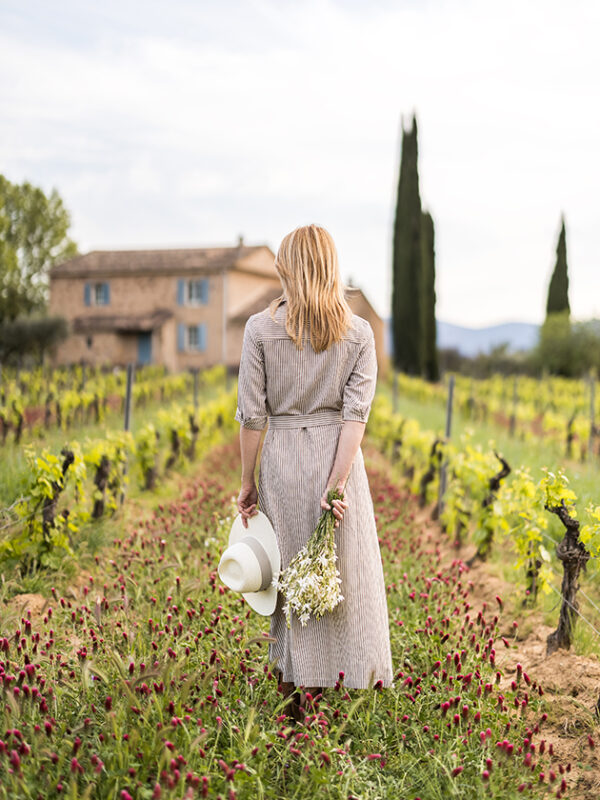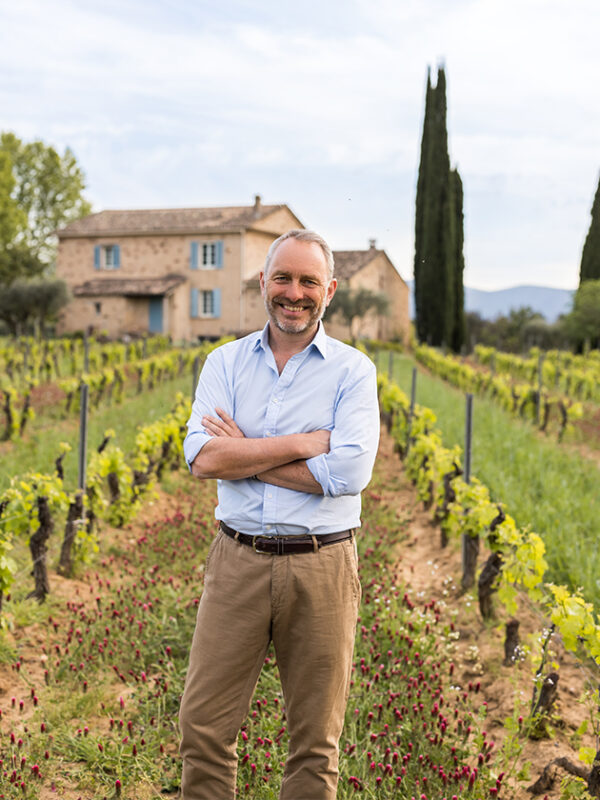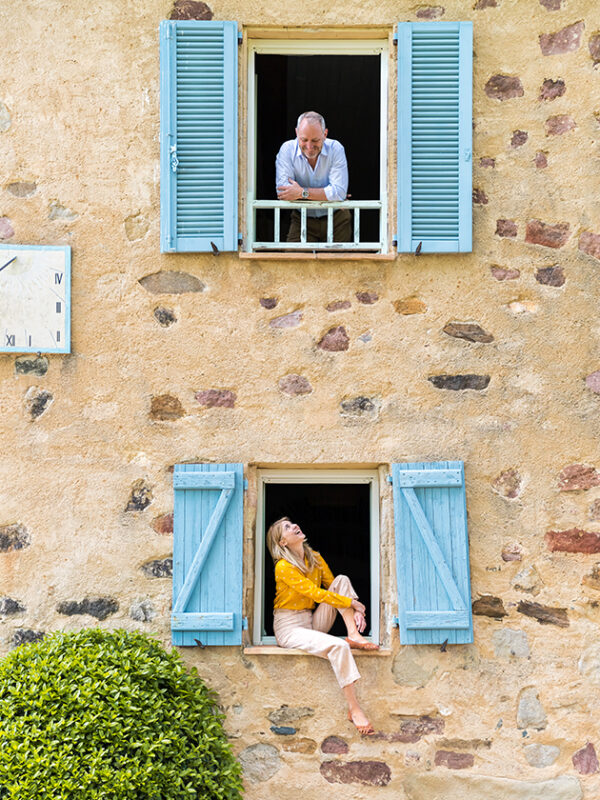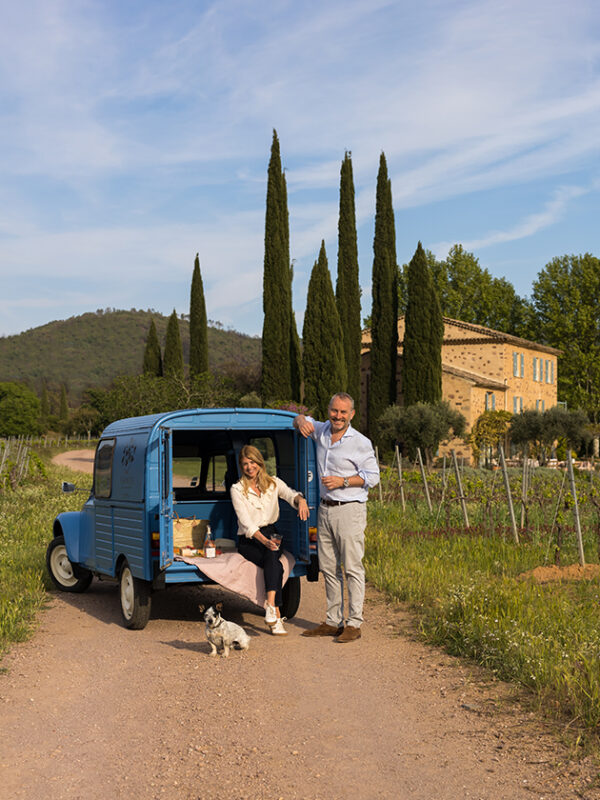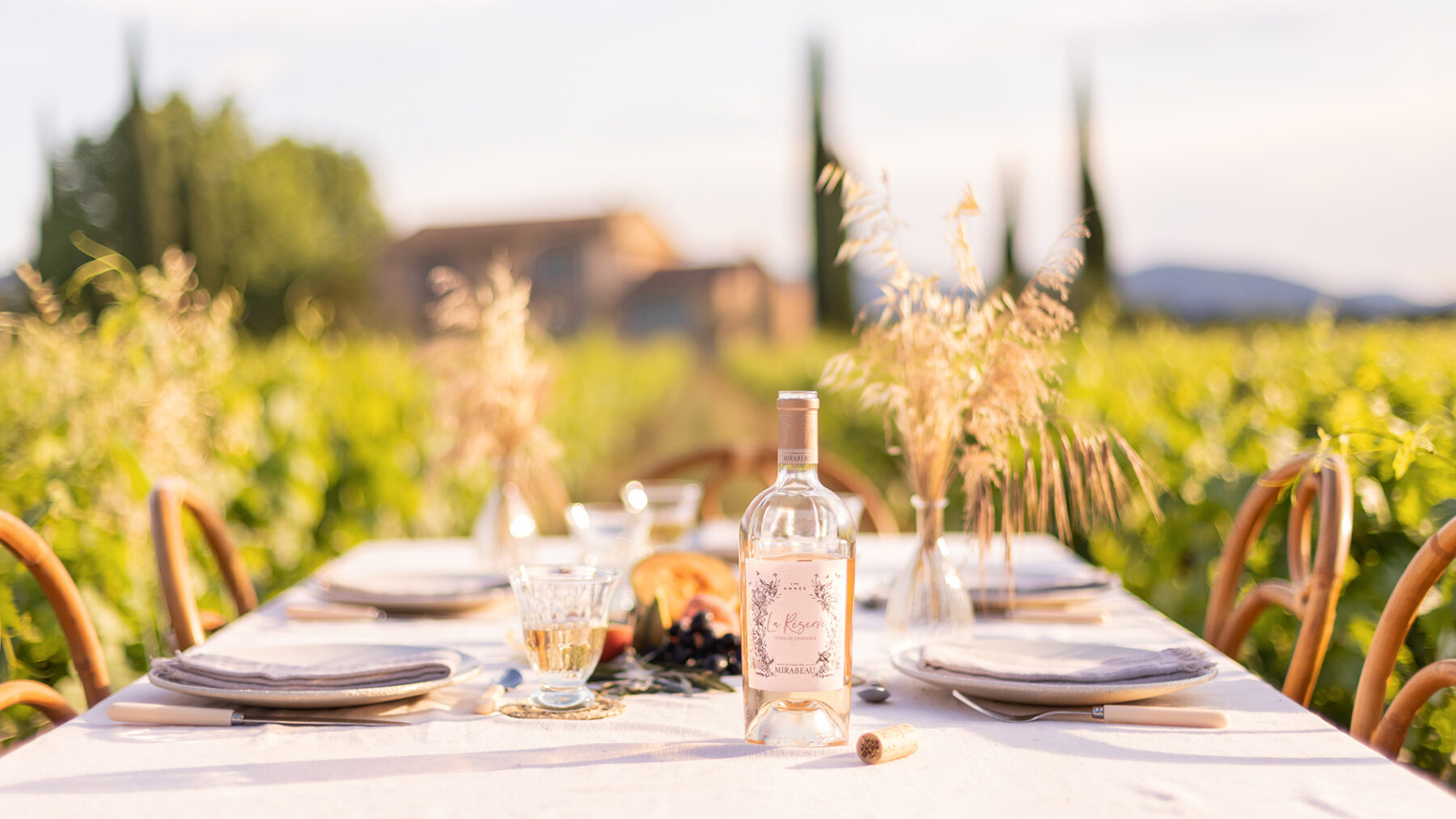La vie en Rosé by Michaela Cordes | 2nd September, 2022 | Personalities
For over 11 years Jeany and Stephen Cronk were secretly dreaming about becoming winemakers in the South of France. One memorable evening in South West London, home to the Cronks and their three children, a close friend challenged them to make their vision a reality.
As the sun goes down against a luminous evening sky, the Domaine Mirabeau and its surroundings are glowing in an almost unrealistic, but quite appropriate, pale pink hue. The loud singing of the cicadas is only interrupted by the gentle popping of a cork. Stephen Cronk and his wife Jeany have invited me to join them for a sundowner on the terrace of their Bastide.
“The longer we lived here, the more we wanted to succeed. So that we could stay forever.” JEANY CRONK
A mere 45 minutes from Saint-Tropez, in the heart of beautiful Provence, surrounded by many other world-renowned rosé producers, a relatively new brand with German-British roots has risen to prominence and is shaking up the traditional, established wine scene. Enter Maison Mirabeau, which was founded by the very likable Cronks. Jeany, originally from Lake Tegernsee in Bavaria, and her British husband Stephen now create seven different rosés and export their extremely popular pale pink wines to more than 50 countries.
Yet twelve years ago this seemed like an un- attainable dream. The family was still living in London. After a successful career in the marketing department of the communications company Energis, Jeany was at home taking care of their three young children. Stephen was still in the telecoms sector, incessantly traveling the world. But in his heart of hearts, he had long been dreaming of a future as a successful winegrower, working and living with his family in their favorite region of Provence.
It was an evening with friends that finally started the ball rolling. More specifically, says Stephen, things began taking shape after a vis- it from an American friend: “We hadn’t seen each other for many years and on that evening, after a few glasses of rosé, I began talking about my life dream and told him that eventually, I was going to quit my job and Jeany and I would move to France and make wine.” The American, who had heard this statement a few times before, followed up this time by asking: “When? Write it down.” So Stephen Cronk, no longer completely sober, went up to the kitchen blackboard and jotted down a reverse timetable with an end date of May 2006. “I drew a circle around the date and said: ‘That’s when we’ll be living in France!’” Brilliant, his friend replied, and took a photo of the blackboard to record the event. That was in 2004.
In May 2006 the same friend sent Stephen a photo of his doodles on the blackboard and asked him: Where are you living now? “Of course we were still in London and nothing at all had changed since our friend’s last visit. I felt crushed because I suddenly realized that I’m the kind of guy I’ve always disliked, someone who talks but never acts, and that now was the time to make this happen,” says Stephen, his gaze wandering across the vine- yard where the Cronks grow the grapes for their own La Réserve label according to regenerative agriculture methods – but more about that later (see the interview on page 40)
Slightly embarrassed and spurred into action, the Cronks realized they were also running out of time. “Our youngest son had just been born and our other two children were seven and eight years old,” Jeany recalls. “Due to the way the English school system worked, we only had a short period of time, no more than two years, to choose the right school and the right place to start our new life.” Stephen revived his old contacts from his stint in the wine trade as a young man. “I worked for a wine shop in London when I was in my 20s, selling wine to restaurants, but stopped doing it soon afterwards because I realized that it wasn’t for me at this time.”
One of the people Stephen contacted turned out to be extremely helpful. “Matthew Stubbs, a Master of Wine, was one of my most important advisors. He told me that the wine business was made up of three Vs: 1, Viticulture, growing vines; 2, Vinification, turning grapes into wine; 3, Vendre, selling the wine. Matthew explained that there was an obsession in the wine trade to own the whole supply chain: to drive the tractor in the morning, be in the winery the next minute and then throw on a suit and go to a tradeshow to sell your wine. He said it’s really not a very efficient way. But there are specialists. He asked if I could drive a tractor and I said: How hard can it be? He said if it was him he would get involved in the second V, in the winemaking and obsess about the third V. Why? Because the farmers here have been growing wine for generations. You can’t learn what they are doing and they can’t do what you need to do – which is to build a business by focusing on the important blending process and sales, and create a strong brand. That was another pivotal point for us.”
Matthew’s advice suited the enterprising couple down to the ground. Jeany, who had been to Cannes often with her parents, spoke some French. So she did the marketing and Stephen traveled the world again to make sales. In the end, listening to the experts definitely paid off, as Jeany puts it: “You can really fall flat on your face if you don’t. There are many sad stories about highly motivated people who follow the wrong strategy, spend all their money and have to give up their dream, even before it’s had a real chance.”
Maison Mirabeau, a family brand that produces exceptionally good rosé, was established in 2010. Jeany says: “Today, we’re doing exactly what all the other big brands in the area do. For those wines that we sell in larger quantities, we choose grapes from winegrowers in the region and blend them according to our taste.” This process is called assemblage in the language of the trade. But where does their passion for rosé come from?
“Jeany and I have always been avid rosé fans,” says Stephen. “We also sensed the beginning of a trend. In the 70s and 80s, rosé wasn’t very well known and wine connoisseurs totally refused to take it seriously, but starting in the 2000s, interest in rosé really started taking off on an international scale.”
Provence is the world leader in these refreshing, pale pink wines and the Mirabeau range easily transmits this longing for summer, lightness of being and good vibes. “Technically,” the Cronks explain, “rosé is the most difficult wine to produce.” Why? “Color is crucial when it come to a good rosé, and getting it right requires a lot of cooling technology,” explains Jeany. “A little too much heat at the wrong moment, or too much pressure on the grapes, and the red color from the skins leaches into the must, so you have to separate the juice from the skins quickly, otherwise you get too much color. And nobody wants dark rosé these days.”
This is also why the grape harvest always takes place at night, in early September when daytime temperatures in Provence can still reach 30° C, but drop to 10 or 15° C during the night. After they are picked, the grapes are loaded onto trailers, where they are immediately cooled with dry ice to stop the oxidation process. Speed is very important to preserve the delicate aromas, Jeany says, and points to the road that snakes through the landscape in the distance. “At harvest time, the roads around here are crowded with tractors racing to the winery because everyone harvests at the same time.” Stephen adds: “Pressing the grapes is also a very modern process. The wine press we use looks like a great steel tank with a bladder inside. It’s a pneumatic press, which squeezes out the juice in the gentlest possible way. If you press too hard you get too much color.”
Rosé doesn’t have to age for many years like red wine does. In fact, rosé is meant to be drunk young. The wines that Maison Mirabeau produces are particularly popular in England, but increasingly, buyers from around the world are also showing an interest in the new label. In order to receive and entertain visitors and position the brand more strongly, the couple invested in this 20-hectare (nearly 50-acre) property three years ago. Mirabeau’s fast growing innovative product lineup also includes a pink gin – packaged in an attractive, cut-glass bottle reminiscent of a costly flask of perfume.
Looking back, what was the secret of their remarkable success? “The fact that each new challenge showed us just how resilient we actually were,” says Jeany with a laugh and goes on to describe how unexpected and eventful the last two years had been. When the coronavirus crisis struck, Maison Mirabeau’s business with restaurant and bars ground to a halt, but this was offset by increased orders from retail stores and private customers, who were able to order wine via the online shop on the company’s homepage.
Last summer, during one of the biggest wildfires Provence has ever seen, the Cronks’ recently acquired vineyard almost went up in flames, and all the neighbors rallied round to help put out the fire. This is one of many dramatic stories that the Cronks can now tell with a smile on their face. In the end, the best advice for putting down deep roots in France came from the former owner of the now famous Chateau Miraval, who had just sold his vineyard to Brad Pitt and Angelina Jolie.
“Just before we were about to leave London and after we had chosen an international school for our children, he told us that we were doing it all wrong,” explains Stephen. “He said that if our children went to an international school, they would gravitate toward the other English-speaking children and wouldn’t integrate properly. And that sending them to a French school would mean they would cry for one year, but would be grateful to us for the rest of their lives. So instead of moving to Aix-en- Provence as we had originally planned, we chose a rural French village with a local school.” Jeany shakes her head as she recalls those early days: “Our older son took it very hard at first and used to say to us: ‘I’m English, I need to go back to England,’ but today he’s more French than the French!”
When they acquired the Domaine Mirabeau estate, the Cronks learned an unexpected lesson on the damaging effects of monoculture farming. The Regenerative Viticulture Foundation, which Stephen Cronk recently established, aims to give resources to winegrowers around the world so that they can learn the advantages of sustainable growing methods with the help of international experts. What got you interested in the subject?
It took us five years to actually find the estate. I didn’t get my head around farming until I had the keys, but then I thought: Now I own the place – I have a big responsibility! I had lots of people offering advice and opinions, but when Stephen Cronk on regenerative agriculture you’re starting out, it’s hard to know who to follow. What I did know was that I didn’t want to spray anything synthetic. Organic farming would have meant plowing, and plowing would have meant tractors and putting a lot of carbon into the air, which I also wanted to avoid.
In the documentary “Kiss the Ground,” U.S. actor Woody Harrelson draws attention to the harmful effects of commercial agriculture. To what extent is this true of commercial winegrowing?
More and more farmers are realizing that traditional winegrowing methods deplete the soil of nutrients. If you keep doing this, it eventually dies and turns into dirt. So it’s important to get people to rethink they way they’re growing wine.
Regeneratively farmed vineyards look very differ- ent from conventional ones. You see bright f lowers growing between the rows of vines, and the plow stays in the barn. Why is this?
Planting a cover crop between the vines draws carbon out of the air and into the earth, where it is sequestered. This also improves the water table and increases the organic life in the soil. In regenerative farming, you have to teach the vines to put down deeper roots, which planting grasses encourages, because otherwise, they compete for the same nutrients. Once the soil is fully regenerated, you no longer need a plow.
Why are tractors and plowing so damaging to healthy, fertile soil?
You have to treat soil as a living organism. It’s full of fungi and bacteria. Once you realize that a single teaspoon of soil contains more than 8 million different microbes, you can imagine what plowing does: It kills them all. But this is exactly what conventional farmers want because they are afraid that other plants will take nutrients away from the vines. The truth is, they don’t: If you grow the right plants, they will exist in harmony with the vines and even produce the minerals that the vines need to grow. There’s a lot of confusion and misinformation on the subject, which is why we’re working through the foundation to publish studies containing verifiable, evidence based facts. That’s what it will take to get people to approach winegrowing differently. After all, it’s their livelihood, they can’t change overnight. Just imagine if I went up to the local farmers here in Provence and told them they should consider selling their tractor and never spraying or plowing. They’d say: Are you crazy? We’ve been doing it for generations. What are you, some kind of English guy who’s just turned up and thinks he knows better? (He laughs).
